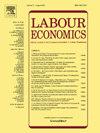Long-term employment effects of the minimum wage in Germany: New data and estimators
IF 2.2
2区 经济学
Q2 ECONOMICS
引用次数: 0
Abstract
We investigate the long-term effects of the introduction of the German minimum wage in 2015 and its subsequent increases on regional employment. Using comprehensive survey data, we are able to measure the regional bite of the minimum wage in 2014, just before its introduction, as well as in 2018, before it was raised substantially in several steps. The introduction mainly affected the labour market in East Germany, while the minimum wage increases increasingly affected low-wage regions in West Germany, with about one third of regions changing their (binary) treatment status between 2014 and 2018. We use different specifications and extensions of the canonical difference-in-differences approach, as well as a set of new estimators that allow unbiased effect estimation with a staggered treatment adoption and heterogeneous treatment effects. Our results show a small negative effect on total dependent employment of 0.5%, driven by a significant reduction in marginal employment of 2.4%. The extended specifications suggest additional effects of the minimum wage increases, as well as stronger negative effects for those regions that were strongly affected by the minimum wage in both periods.
德国最低工资对长期就业的影响:新数据和估算
我们调查了2015年德国最低工资的引入及其随后对地区就业的增长的长期影响。利用全面的调查数据,我们能够衡量2014年最低工资标准出台前的地区影响,以及2018年最低工资标准分几步大幅提高之前的地区影响。这一举措主要影响了东德的劳动力市场,而最低工资上涨对西德低工资地区的影响越来越大,在2014年至2018年期间,约有三分之一的地区改变了(二元)待遇状况。我们使用了标准差分方法的不同规范和扩展,以及一组新的估计器,这些估计器允许使用交错处理采用和异质处理效果进行无偏效果估计。我们的研究结果显示,在边际就业显著减少2.4%的推动下,对总依赖就业产生了0.5%的小负面影响。扩展后的规范表明,最低工资的增加会产生额外的影响,对那些在两个时期都受到最低工资强烈影响的地区也会产生更强的负面影响。
本文章由计算机程序翻译,如有差异,请以英文原文为准。
求助全文
约1分钟内获得全文
求助全文
来源期刊

Labour Economics
ECONOMICS-
CiteScore
3.60
自引率
8.30%
发文量
142
期刊介绍:
Labour Economics is devoted to publishing research in the field of labour economics both on the microeconomic and on the macroeconomic level, in a balanced mix of theory, empirical testing and policy applications. It gives due recognition to analysis and explanation of institutional arrangements of national labour markets and the impact of these institutions on labour market outcomes.
 求助内容:
求助内容: 应助结果提醒方式:
应助结果提醒方式:


